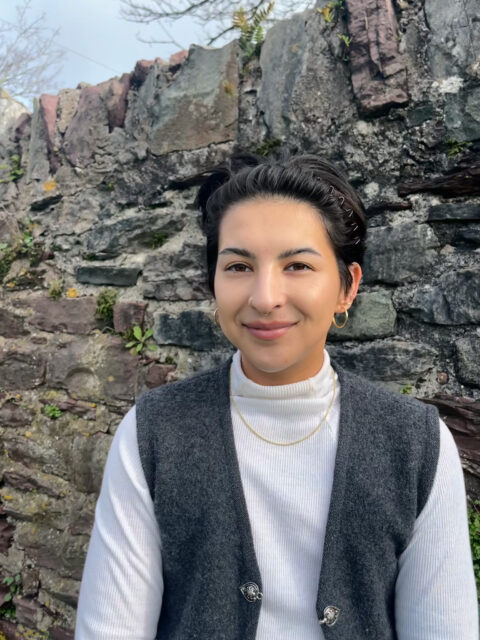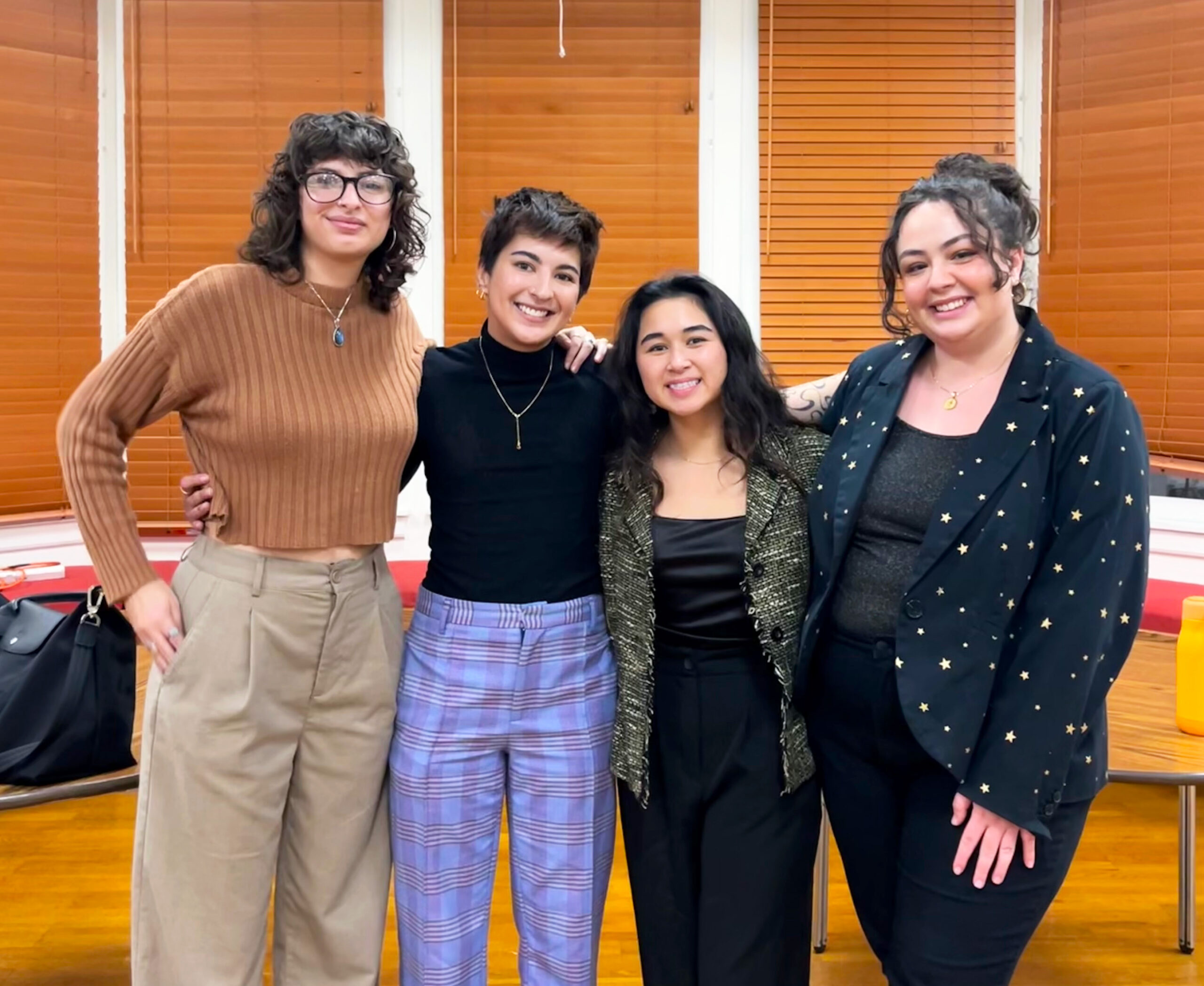Above: Phoenix Woodall (John R. Lewis College ’22) and former Everett fellow Mo Dick (Oakes ’20) on the set of Adamu Chan’s What These Walls Won’t Hold in March 2021 (photo courtesy Mo Dick)
There are a fair number of shocking statistics regarding incarceration in the United States. For one, the country holds just 4% of the global population, yet accounts for 20% of its incarcerated population.
As one of its signature projects, the Everett Program for Technology and Social Change at UCSC aims to raise awareness of our high levels of incarceration while providing incarcerated people with the opportunity to learn technology tools and share their experiences through digital media.
Initially launched in fall 2019, the Gateways Project of the Everett Program sought to do just that, with students through the larger Everett Program looking to begin community discussion around issues of mass incarceration and punitive justice. Since then, Gateways has grown into a network of student projects centered around access to tech for incarcerated people and supporting incarcerated voices, with tech-training programs in local Santa Cruz jails and San Quentin State Prison, assistance to a couple of documentary film projects and a statewide advocacy coalition, and a recent project highlighting the history of racial injustices in Santa Cruz.
Training in marketable computer skills

Everett Program Director Chris Benner (photo by Carolyn Lagatutta)
Everett Program Director Chris Benner said the Gateways project—for which he is faculty director—was initially launched by an Everett fellow, Mo Dick (Oakes ’20, sociology), who now serves as the project manager. Dick (they/them), who first began working with the Everett Program in 2018, had never seen a program like Gateways in Santa Cruz County, and originally aimed to provide incarcerated individuals with marketable computer skills to aid in job opportunities and re-entry.
The team worked with the Santa Cruz County Sheriff’s Office to do technology training programs for those incarcerated in local correctional facilities.
According to the Prison Policy Initiative, roughly 80% of people jailed in local facilities nationally have not been convicted of a crime.
Thus, two of the goals for Gateways were to: (1) provide marketable skills for incarcerated individuals to help reduce recidivism rates, while (2) further breaking down the stigma around incarceration.
Evolving classes
Gateways began in partnership between the university and Santa Cruz County jails in late February 2020, before transitioning to virtual learning due to the COVID-19 pandemic. Gateways classes took place in local correctional facilities, such as Watsonville’s Rountree Medium Security Facility or the Blaine Street Women’s Facility in Santa Cruz. Students specifically worked with those in the rehabilitation and re-entry unit, where incarcerated individuals have earned the privilege to be there and take classes.

Former Everett fellow Mo Dick (Oakes ’20, sociology), who now serves as the project manager for Gateways (photo courtesy Mo Dick)
“None of the existing classes included computers, which was really wild to me because of our proximity to Silicon Valley—you just need to know how to use a computer,” said Dick.
When the program started, Gateways began with a 12-week course in basics for computers, then went into graphic design and other skills. However, from the start, Dick said the group had a “wide array” of tech skills, from those who had never turned on a computer before to people who were able to code.
“Some of the students have prior bachelor’s or master’s degrees in computer work, and others know just what they know from growing up around computers,” Dick said.
That led to a split into three different classes: (1) introductory computer usage, (2) graphic design, and (3) video editing. Each class has approximately 12 to 18 students, said Benner.
Remote challenges

Gateways team members Miguel Salcedo (Oakes ’23) and Katheline Vanegas (Stevenson ’23) practice camera work in October 2022 (photo courtesy Mo Dick)
In continuing their work remotely during the pandemic, Gateways was challenging, with achievements not coming as readily as desired. As such, Dick wanted to work with the students in another mode, and supported the Stop San Quentin Outbreak Coalition in June 2020, with the goal of bringing public attention to ongoing COVID-19 outbreaks in California state prisons, jails, and U.S. Immigration and Customs Enforcement (ICE) detention centers.
“We ended up being connected to a really great community of formerly incarcerated people, family members, advocates, religious leaders, and students from around the Bay Area,” Dick said. “All of the work we were doing with Gateways was able to be informed by formerly incarcerated people.”
In the months to come, many incarcerated individuals were able to be sent home as California Gov. Gavin Newsom released thousands of people from the state prison system in an effort to save lives amid devastating coronavirus outbreaks at several facilities, said Dick. For those released, Gateways offered online video editing, graphic design, and online organizing courses.
“We made some really great connections with the incarcerated community,” Dick said, which included Forward This Productions, an organization focused on transforming prison culture from inside San Quentin State Prison. Forward This was looking for support in terms of video production and the like, which led to a Gateways partnership.
Chris Benner is director of both the Everett Program for Technology and Social Change and the Santa Cruz Institute for Social Transformation. A professor of environmental studies and sociology, Benner is one of the initial partners to receive funding from the recently launched Community Economic Mobilization Initiative.
Read more >>
Moving forward with Forward This
For approximately four months, Dick and three of the students went to San Quentin weekly to lead different workshops with the crew, lasting between three to four hours apiece. It further led to co-teaching with some of the senior members of Forward This and expanding on the curriculum.
During this time, the Gateways team met filmmaker Thanh Tran, formerly incarcerated at San Quentin and now working in partnership with Gateways on his documentary, Finding Ma. The documentary tells Tran’s story of entering foster care as a baby, and how that journey led to his stay at San Quentin for 10½ years. Now, Tran looks to connect with his family and his foster mother.
“The foster care system is another pathway into prison for so many people,” said Benner. In the film’s trailer, Tran notes that 70% of youth who exit the foster case system as legal adults are arrested at least once by age 26.
Through Forward This, Benner said, Tran was able to develop the technical skills that have helped him to have more successes post-release. Gateways team members were able to develop a strong relationship with Tran and use that relationship as a basis for forming others within Santa Cruz County jails.
Gateways team members also fundraised for Tran’s documentary during UCSC’s 2022 Giving Day, and received the greatest number of individual donors for any project that day, which awarded them an additional $10,000.
Profound learning
Because of the work with Tran and the local county jails this academic year, Benner says the work with San Quentin is currently on hold, but likely to resume in 2023–24.
In all of the work that Gateways has achieved in the last three years, Dick harkened back to the original aims of Gateways under the larger Everett Program umbrella.
“One of our main goals is to create a peer-to-peer tech environment, where students can teach themselves in a non-intimidating environment, and we tried to bring that to the county jails,” Dick said. “Countless studies do show that any type of education can reduce recidivism up to 70%, and specifically tech education can reduce it more.”

Gateways team members Isabelle Aguirre (Kresge ’22), Mo Dick (Oakes ’20), Tina Bullington (Stevenson ’21), and Phoenix Woodall (John R. Lewis College ’22) (photo courtesy Mo Dick)
“I think the most profound learning is just talking to people who are incarcerated,” said Benner. “You understand more about the difficult economic circumstances people were involved in, the difficult choices they’ve had to make in their lives, the relatively small mistakes that could result in decades of incarceration—as well as the humanity of people who are incarcerated in prison and the inhumane ways they are sometimes treated in our criminal legal system.”
Ultimately, Dick and the team want incarcerated students to feel comfortable enough to take their skills out into the world. Because Gateways is a volunteer program through the county jails, the team cannot stay in contact with students post-practicum; mostly, the team learns about students’ expertise through post-class surveys.
The Gateways program will go back to the Santa Cruz County jails in 2023–24 to begin a three-course series on computer basics, graphic design, and videography.
“The relationships that are built between incarcerated people and UCSC students provide powerful growth opportunities for the people involved, and can be an important step in the ultimate goal of reforming our criminal legal system,” Benner said.

